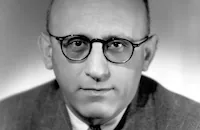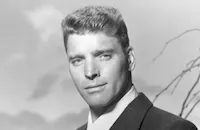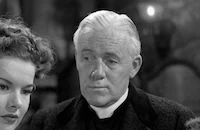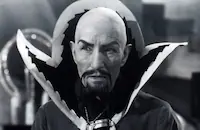The Killers

Brief Synopsis
Cast & Crew
Robert Siodmak
Burt Lancaster
Ava Gardner
Edmond O'brien
Albert Dekker
Sam Levene
Film Details
Technical Specs

Synopsis
Two hitmen, Al and Max, drive into Brentwood, New Jersey, in search of Pete "Swede" Lund, and stake out a diner he frequents, questioning, among others, customer Nick Adams about Swede's whereabouts. After the men leave, Nick races to Swede's boardinghouse room to warn him and is stunned when Swede seems resigned to his fate. Shortly after Nick's departure, Al and Max find Swede waiting in his room and shoot him to death. When it is discovered Swede had a small life insurance policy with Atlantic Casual, insurance investigator James Riordan begins investigating his murder. Jim first questions Nick, who worked with Swede at a filling station, and Nick recalls that Swede stopped coming to work the week before his murder after waiting on a wealthy, middle-aged stranger at the station. Jim then calls on Swede's beneficiary, Mary Ellen "Queenie" Doherty, a cleaning woman at an Atlantic City hotel. Queenie recalls Swede staying at the hotel some six years earlier, when she stopped him from throwing himself out of the window. Upon returning to his office, Jim learns that Swede was a former boxer, whose real name was Ole Anderson, and that after his fight career ended, he served three years in prison for robbery. Jim visits Swede's arresting officer, police lieutenant Sam Lubinsky, who tells him that he and Swede had grown up together in Philadelphia and that his wife Lilly dated Swede before her marriage. Lilly then recalls her final date with Swede at a party given by Jake "the Rake" in a lavish apartment owned by "Big Jim" Colfax, where they met Blinky Franklin and singer Kitty Collins, to whom Swede is immediately attracted. Then Sam adds that some time later, while working on a jewelry heist, a tip led him to Jake and Kitty, whom he suspected of wearing a piece of the stolen jewelry. When Sam tried to arrest her, Swede intervened and claimed responsibilty for stealing the jewlery, which landed him in prison. Sam asks Jim if he can help with the investigation and later that afternoon, at Swede's burial service, Sam points out Charleston, a small-time hood and acquaintance of Swede's, to Jim, who later questions him. Charleston reveals that he and Swede shared a prison cell together and that Swede referred to Kitty as "his girl," and asked Charleston to visit her upon his release: After Swede is released, Charleston is sent by Colfax to summon him to a meeting with Blinky, another thug, Dum Dum, and a mysterious woman. Colfax has planned a payroll heist at a hat company which promises a $250,000 payoff, but the older Charleston finds the risk too great and withdraws, and never sees Swede again. After leaving Charleston, Jim digs up information that Atlantic Casual insured the hat company and discovers details of the heist. Sam then contacts Jim to inform him that Blinky has been discovered shot and near death. Both men hurry to the hospital, where Blinky, semi-conscious, rambles about the robbery: After the heist, the group was forced to change their meeting place as the scheduled halfway house had burned down unexpectedly. Swede arrives last and after accusing Colfax of trying to cheat him, takes all the money and flees. Back at the hospital after Blinky dies, Jim feels sure the robbery is connected to Swede's murder and stakes out his old room at the boardinghouse. Soon after, Dum Dum rents Swede's old room and begins an elaborate search. Jim breaks in on him and demands to know more details of the robbery, specifically why the meeting place was changed. Dum Dum admits Kitty was the woman involved and that just after midnight the night before the robbery she had told each of them separately about the change, which Swede later claimed he was not told. Jim tells Dum Dum that Swede had run off with Kitty and that later in Atlantic City, Kitty had disappeared with the money. Dum Dum escapes from Jim and despite a police cordon, gets away. Later when Jim receives notification that the halfway house burned down after two a.m., not midnight, he is certain Colfax and Kitty are behind Swede's murder, but Sam insists Colfax has gone straight. Jim goes to the factory Colfax is now managing, but Colfax claims no knowledge of the robbery or Kitty's whereabouts. Later, however, Jim receives a telephone call from Kitty, suggesting they meet. Driving away from their agreed-upon rendezvous spot, Kitty and Jim are unknowingly trailed by Al and Max to a night club. There, Kitty tells Jim that the night before the robbery, she convinced Swede that the others were double-crossing him, so he would agree to take her away from Colfax. She insists that she left Swede in Atlantic City with the money and pleads with Jim not to involve her further as she is now married and has a good home. Jim demands that she give him proof of Colfax's participation and she agrees, but as they prepare to leave the club, she disappears into the ladies room. Meanwhile at the bar, Al and Max begin to move in on Jim, but are cut off and shot by Sam who is also at the bar. Jim realizes Kitty has escaped and, with Sam and a police backup, heads to Colfax's house. They arrive to a series of gunshots and find Dum Dum dead at the bottom of the stairs and Colfax fatally wounded on the landing with Kitty hovering over him. Jim tells Colfax he had discovered Kitty was his wife and could not testify against him. Colfax admits to having Swede killed, in fear that the other gang members would find him and realize that Colfax and Kitty had double-crossed them and kept all the money. Colfax dies as Kitty pleads for him to declare her innocent.

Director

Robert Siodmak
Cast

Burt Lancaster

Ava Gardner

Edmond O'brien

Albert Dekker

Sam Levene

Vince Barnett
Virginia Christine
Jack Lambert

Charles D. Brown

Donald Mcbride

Charles Mcgraw

William Conrad

John Miljan
Phil Brown
Queenie Smith
Garry Owen
Harry Hayden

Bill Walker

Jeff Corey
Wally Scott
Gabrielle Windsor
Harry Brown
Beatrice Roberts

Howard Freeman
John Berkes
John Sheehan
George Anderson

Charles Middleton
Al Hill
Noel Cravat
Rev. Neal Dodd
Vera Lewis
Howard Nogley
Perc Launders
Geoffrey Ingham
Milton Wallace
Nolan Leary
John Trebach
Ann Staunton
William Ruhl
Therese Lyon
Ernie Adams
Jack Cheatham
Ethan Laidlaw
Michael Hale
Wally Rose
Audley Anderson
Mike Donovan
Rex Dale
Crew
Woody Bredell
Jack Brooks
Bernard B. Brown
Jules Buck
Carmen Dirigo
Russell A. Gausman
William Hedgcock
Mark Hellinger
Arthur Hilton
D. S. Horsley
Martin Obzina
Jack Otterson
Jack P. Pierce
E. R. Robinson
Miklos Rozsa
Miklos Rozsa
Melville Shyer
Anthony Veiller
Vera West

Photo Collections
Videos
Movie Clip



Hosted Intro




Film Details
Technical Specs

Award Nominations
Best Director
Best Editing
Best Score
Best Writing, Screenplay
Articles
The Killers (1946)
Directed by Robert Siodmak, The Killers boasts a script by an uncredited John Huston and a great score by Miklos Rozsa (later mined for the theme for Dragnet). A box-office smash, the film played round-the-clock at New York's Winter Garden theater, where over 120,000 patrons saw the film in the first two weeks. While Siodmak was widely praised for his economical direction, most of the press and public focused their attention on the two new newcomers: Burt Lancaster and Ava Gardner.
Lancaster, a former circus acrobat, was 23 when the picture was made, but his youthful face allowed him to play a younger and more easily duped man. Paid $20,000 for his work on The Killers, Lancaster was an overnight star. As the double-crossing and triple-crossed Swede, Lancaster's film debut drew immediate notice. Critic Manny Farber called him "a fascinating, unstereotyped movie tough" with "a dreamy, peaceful, introspective air that dissociates him from everything earthly." Farber accurately captures what is so unique about Lancaster: the combination of American boyishness with an icy, otherworldy presence. He was the perfect choice to play a man calmly waiting for his own death. Siodmak was so taken with Lancaster that he cast him in two subsequent films: the convoluted noir, Criss Cross (1949), thought by many to be Siodmak's best film, and the swashbuckling epic, The Crimson Pirate (1952).
Ava Gardner had been under contract with MGM since 1941, and though she had been married to Mickey Rooney, one of the studio's biggest stars (1942-1943), she had yet to appear in any memorable roles. But independent producer Mark Hellinger had been impressed by Gardner's performance in Whistle Stop (1946) and wanted her to play the voluptuous and deceitful Kitty Collins. After some delays, MGM agreed to loan Gardner (married now to bandleader Artie Shaw) out to Universal and Gardner always cited Hellinger's interest in her as a turning point in her career: "Mark saw me as an actress, not as a sexpot. . . . he gave me a feeling of responsibility about being a movie star that I'd never for a moment felt before." As with Lancaster, Gardner's performance was widely acclaimed and she won Look magazine's award for the best newcomer of the year.
The Killers was loosely based on Ernest Hemingway's 1927 short story of the same name. In the story, neither the killing nor the motives behind it are explained. The story ends with the Swede stoically waiting for the killers to find him, and the narrator, Nick Adams (played by Phil Brown), being admonished that it was "better not to think about it." According to Hemingway, "The story was about coming back from the war, but there was no mention of the war in it." Hemingway had refused all of Hollywood's earlier offers to secure the rights to his work, but because Hellinger was what Hemingway described as an "old friend," the deal was done, though Hemingway evidently signed on without knowledge of how drastically his story would be changed. While the script opens with a faithful rendition of Hemingway's story, it proceeds to "think about it" for another 90 minutes, even adding two new major characters: the insurance investigator Riordan (Edmond O'Brien) and the crime boss Colfax (Albert Dekker).
Hemingway actually offered some script advice to Huston and the two hunters became life-long friends. The writer was also taken with Ava Gardner and they too remained close throughout their lives. Gardner went on to appear in two other Hemingway adaptations: The Snows of Kilimanjaro (1952) and The Sun Also Rises (1957). According to Gardner, Hemingway "always considered The Killers the best of all the many films his work inspired, and after Mark Hellinger, the producer, gave him a print of his own, he'd invariably pull out a projector and show it to guests at Finca Vigia, his place in Cuba. Of course, he'd usually fall asleep after the first reel, which made sense, because the first reel was the only part of the movie that was really taken from what he wrote."
The film also established Siodmak as an A-list director, a reputation which was confirmed by his next two pictures: The Spiral Staircase (1946) and The Dark Mirror (1946). Born in the U.S. while his German parents were here for a visit, Siodmak was raised in Germany and found work at the renowned UFA studios, alongside Billy Wilder, Fritz Lang, and Otto Preminger. Siodmak came to Hollywood in 1940 and brought to his pictures the expressionist techniques he had learned at UFA. He so well translated these techniques to the American pictures that critic Andrew Sarris once noted that Siodmak's Hollywood films are "more Germanic than his German ones." The Killers is a classic example of Siodmak's preference for expressionist lighting and deep-focus photography.
Interestingly, Don Siegel was originally considered to direct the picture, and while Hellinger went with Siodmak, Siegel did get his chance, though not until 1964 when he made a version for television starring Angie Dickinson, Lee Marvin and Ronald Reagan in a villainous role. Even acclaimed Russian director Andrei Tarkovsky adapted the Hemingway short story into a short movie he made during his film school days.
Producer: Mark Hellinger
Director: Robert Siodmak
Screenplay: Anthony Veiller, based on the story by Ernest Hemingway
Cinematography: Elwood Bredell
Editing: Arthur Hilton
Art Direction: Martin Obzina, Jack Otterson
Music: Miklos Rozsa
Cast: Burt Lancaster (Ole Anderson, aka "Swede"), Ava Gardner (Kitty Collins), Edmond O'Brien (Jim Reardon), Albert Dekker (Big Jim Colfax), Sam Levene (Lieutenant Sam Lubinsky), Virginia Christine (Lilly Harmon Lubinsky), William Conrad (Max), Charles McGraw (Al), Vince Barnett (Charleston).
BW-105m.
By Mark Frankel

The Killers (1946)
The Killers (Criterion Edition) - THE KILLERS - A Double DVD exclusive featuring the 1946 & 1964 versions
Apart from using Hemingway's story as a jumping off point, the two features have very little in common. (Actually, after the first few minutes, they have very little to do with the source material.) A similar thread runs through both versions, but the narratives soon take entirely different paths.
Siodmak's sinister earlier installment features Burt Lancaster, in his debut performance, as The Swede, a doomed filling station attendant who's being pursued by a pair of vicious hired killers. The reasons for The Swede's almost sacrificial acceptance of his own death are pieced together by an obsessive insurance agent (Edmund O'Brien) who's also investigating a hat factory heist. Ava Gardner is on hand as well, as a drop-dead gorgeous femme fatale. The story is told through a complex series of flashbacks that reflect the influence of 1941's similarly structured Citizen Kane, and the dialogue crackles from beginning to end.
Siegel's 1964 TV-movie version - it was finally released in theaters after being deemed too violent for the tube - also has a lot going for it, although it features crisp, bright lighting in place of Siodmak's expressionistic shadows. The hit men in Siegel's film (Clu Gulager and Marvin) ruthlessly stalk a teacher for the blind (played by John Cassavetes.) When Cassavetes' character makes no attempt to run before his violent death, the killers want to know his story. The trail leads to a glamorous woman he once loved (played by Angie Dickinson), and nasty, suit-wearing crime lord (Ronald Reagan, in his final performance before later playing the President of the United States.)
As already stated, Criterion didn't scrimp on the extras:
* Bold new digital transfers that clarify both the shadows and the light
*Director Andrei Tarkovsky's 1956 student film version of the story
* A Screen Director's Playhouse 1949 radio version starring Lancaster and Shelley Winters
* Stacy Keach reading Hemingway's short story
* Writer-director Paul Schrader's seminal 1972 essay, Notes on Film Noir, which introduced many Americans to the numerous specifics of noir
* Publicity material for both pictures, including stills, rare behind the scenes shots, press books, and newspaper ads
* A video interview with Clu Gulager, in which he specifically hails Marivn's death scene
* Excerpt from Don Siegel's autobiography, A Don Siegel Film
* A video interview with Siegel's biographer, Stuart M. Kaminsky
*Production correspondence from the 1964 version, including memos from Siegel and broadcasting standards reports
For more information about the DVD special edition of The Killers, visit The Criterion Collection web site. To order The Killers, visit TCM Shopping.
by Paul Tatara
The Killers (Criterion Edition) - THE KILLERS - A Double DVD exclusive featuring the 1946 & 1964 versions
Quotes
He's dead now, except for he's breathing.- Doctor
How much time has he got.- Jim Reardon
He's behind schedule now.- Lieutenant Sam Lubinsky
She took a powder. The dough went with her.- Jim Reardon
Good morning, Stella.- Reardon
Good morning, dream boy.- Stella
I'm poison, Swede, to myself and everybody around me.- Kitty Collins
Don't ask a dying man to lie his soul into Hell.- Lt. Sam Lubinsky
Trivia
In-joke: In the scene towards the end of the film where Edmond O'Brien arranges to meet Ava Gardner outside of a nightclub, O'Brien stands on the street in front of the club, waiting for Gardner to drive up. On the wall behind him is a poster beginning, "Sir Arthur Hilton presents..." Arthur Hilton, an Englishman, was the film's editor.
The musical theme used whenever the killers appear was later used in expanded form as the theme music for the TV show "Dragnet" (1951)
The boxing match in the third flash-back was filmed in a boxing arena for an audience of two thousand spectators. Burt Lancaster trained for two months with a boxing champion and played the part of Sweeney with realism, against a real boxer, until his 2nd KD and TKO.
Notes
The opening title cards read: "Mark Hellinger Productions, Inc. presents Ernest Hemingway's The Killers." The Killers was the fourth Hemingway work to be adapted to the screen, following A Farewell to Arms (see AFI Catalog of Feature Films, 1931-40; F3.1275), For Whom the Bell Tolls and To Have and Have Not (see below). The entire plot of the Hemingway short story occurs in the film's opening sequence; the remainder of the film, written by Anthony Veiller, explains the murder of "Ole (Swede) Anderson." Papers in the Mark Hellinger Collection at the USC Cinema-Television Library indicate that Hellinger paid Hemingway approximately $50,000 for the rights to the story, but that publicity items inflated the figure to $75,000. Richard Brooks stated in a modern interview that he wrote a version of the script; his contribution to the final film is undetermined.
According to a Hollywood Reporter news item, M-G-M agreed to loan Audrey Totter to Universal for the role of "Kitty Collins," but a production reshuffle at M-G-M, brought about by Robert Montgomery's walkout on Desire Me, nullified the agreement. Universal then borrowed Ava Gardner from M-G-M for the role. Other information from the Hellinger Collection notes a clause in Gardner's contract requesting that her singing voice not be dubbed in The Killers. The film marked Hellinger's first producing assignment at Universal and the screen debuts of Burt Lancaster (1913-1994), William Conrad (1920-1994) and African-American character actor William "Bill" Walker (1896-1992). According to contemporary sources, after Lancaster made a notable appearance in the brief Broadway run of the 1945 Harry Brown play A Sound of Hunting, he was brought to Hollywood. Hollywood Reporter and New York Times praised Lancaster's performance in The Killers and noted his star potential. A Hollywood Reporter news item indicates Barbara Powers was cast in the film, but her appearance cannot be confirmed. The film was nominated for four Academy Awards: Best Director, Best Film Editing, Best Score and Best Screenplay, but lost in all four categories to The Best Years of Our Lives. Composer Miklos Rozsa's "Danger Ahead" refrain, which is heard in The Killers, later became the inspiration for the highly recognizable Dragnet theme song (see AFI Catalog of Feature Films, 1951-60).
Burt Lancaster recreated the role of "Swede" in a Screen Directors Playhouse radio broadcast on June 5, 1949. Shelley Winters co-starred as "Kitty." The Killers was remade by Universal in 1964 (see AFI Catalog of Feature Films, 1961-70; F6.2593). The remake, which utilized both the Hemingway story and Anthony Veiller's screenplay, was directed by Don Siegel and starred Nick Cassavetes, Angie Dickinson and Ronald Reagan in his last film role.














